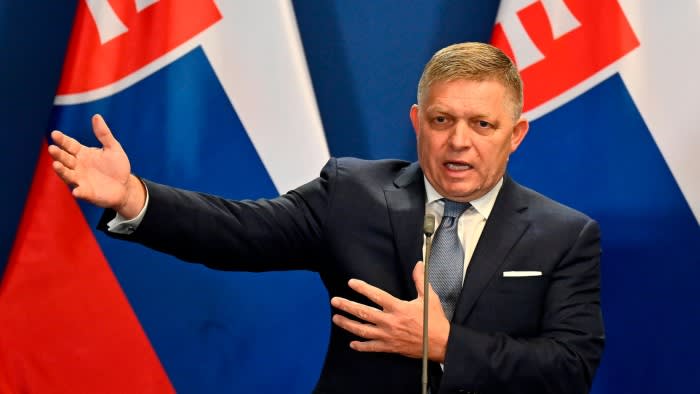Roula Khalaf, Editor of the FT, selects her favourite stories in this weekly newsletter.
The author is an associate fellow at the Centre for European Reform
After Soviet tanks invaded Czechoslovakia in 1968, Milan Kundera observed that a small nation “is one whose very existence can be put in question at any moment”. The recent shooting of Slovak prime minister Robert Fico, who survived the attempt, has underscored this fragility for the central European nation of 5.4mn. But the primary threat to Slovakia today comes from within — a sharply polarised society.
The assassination attempt on Fico is unprecedented for Slovakia but follows a series of high-profile incidents. In 2018, the murder of investigative journalist Ján Kuciak and his fiancée sparked the largest protests since the 1989 Velvet Revolution. A recent homophobic attack in Bratislava claimed two young lives. Zuzana Čaputová, Slovakia’s outgoing president, chose last year not to seek re-election, partly because of death threats against her and her family.
Fico became premier in 2006 on a leftwing platform, but soon became embroiled in corruption scandals. After he left office in 2018, some of his closest colleagues faced criminal prosecution. Last September he staged a comeback, winning parliamentary elections by tapping into nationalist sentiments.
His government has not shied away from controversy. In just six months, it has abolished the special prosecutor’s office tasked with investigating high-profile corruption cases, softened penalties for white-collar crime and distanced itself from the western foreign policy consensus on Ukraine and China. Still, political disagreement must be tolerated in a democratic society; any form of political violence must not.
The attack on Fico should prompt reflection about what has brought Slovakia to this point. The nation has long been split between liberal-leaning, pro-western urban voters and older, poorer and rural Slovaks nostalgic for the pre-1989 era. And Slovak politicians have exploited these rifts for years. Recent elections have shifted from contests of political ideas into clashes of values and world views. On one side is the aspiration to align with the political west; on the other, disappointment at post-1989 trends and the cultural conditions of central and eastern Europe.
What bodes ill for reconciliation are the developments after the attack. A shortlived moment of unity emerged when Čaputová and her successor, Peter Pellegrini, called for calm. But ultranationalists from the ruling coalition blamed the attack on the liberal opposition and media’s “witch hunt” against Fico. Nor does the government seem much deterred from pushing its agenda. Since the shooting, it has passed a law placing the arts council under political control and advanced plans to dismantle the state broadcaster — all while ignoring the country’s most acute challenges. Slovakia faces the Eurozone’s highest deficit this year and its dire public finances require cuts of 1.5 per cent of GDP under the EU’s new fiscal rules.
This puts opposition parties in a near-impossible task of having to challenge government policies without engaging in a destructive blame game. The EU, too, faces a hard choice. The European Commission, which had earlier warned Fico about the consequences of his government’s actions, must decide whether to freeze €3.7bn from the EU’s post-pandemic recovery fund. Suspending these funds now could bolster Fico’s nationalist appeal, but ignoring his transgressions would give succour to nationalist-populists elsewhere across Europe.
What Slovakia, a small nation wrestling with large internal rifts, needs now is political leadership that restores decency in public life. Rejecting political violence was the necessary first step. But Slovaks across the political spectrum must also recognise that the attack cannot serve as a pretext to suppress legitimate critics of government policies. How Slovakia navigates this delicate balance will be the test of its national resilience.
Source link : https://www.ft.com/content/cf422c44-283b-4825-b2c1-bc68b53f36f0
Author :
Publish date : 2024-06-03 07:00:00
Copyright for syndicated content belongs to the linked Source.
